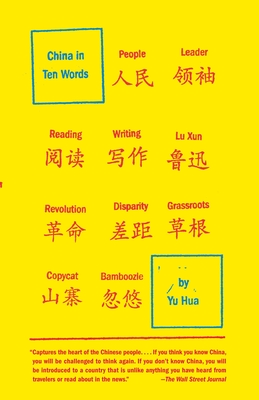From one of China’s most acclaimed writers: a unique, intimate look at the Chinese experience over the last several decades.
Framed by ten phrases common in the Chinese vernacular, China in Ten Words uses personal stories and astute analysis to reveal as never before the world’s most populous yet oft-misunderstood nation. In "Disparity," for example, Yu Hua illustrates the expanding gaps that separate citizens of the country. In "Copycat," he depicts the escalating trend of piracy and imitation as a creative new form of revolutionary action. And in "Bamboozle," he describes the increasingly brazen practices of trickery, fraud, and chicanery that are, he suggests, becoming a way of life at every level of society. Witty, insightful, and courageous, this is a refreshingly candid vision of the "Chinese miracle" and all of its consequences.
Edward says:
"Yu Hua's collection of essays, China in Ten Words, traces the
path of China from the Cultural Revolution to the present day. The ten words are people, leader, reading,
writing, Lu Xun, revolution, disparity, grassroots, copycat and bamboozle.
The idea of people was synonymous with Chairman Mao and the
very name, the People's Republic of China.
One defining moment in his understanding of people came in the Tiananmen
Incident of 1989 when students flocked to the famous Square demanding democracy. The movement of the people seemed like it
would last forever and then ended as abruptly as it had began when the military
moved in and cleared the Square. He describes riding his bicycle toward Tiananmen
and being overwhelmed by the heat generated by so many bodies singing and
demanding change even though the evenings were cold when faced alone.
The essay on leader centered around Mao Zedong and his
larger than life presence in China.
Whether it was how he was represented in writing a big character poster
or swimming in the Yangtze River, he achieved an immortal type status. The only other leaders represented in
pictures were those of Stalin, Marx, Engels, and Lenin. It brought up memories of my own elementary
school days where the likenesses of Washington, Jefferson, and Lincoln grace
the walls. So influential was Mao that
his poems and quotations were often put to song. The man who had the good fortune of shaking
his hand would return to his village a celebrity. When the announcement of Mao's death was made
at schools, the students openly wailed and wept at the passing of their great
leader.
The chapter on reading traces a China which could read
openly and then was limited to only two works, The Selected Works of Mao Zedong
and the Little Red Book, Quotations from Chairman Mao. This
chapter details how Yu Hua had to get "bootleg" copies of classic,
forbidden works which had been handwritten and were passed from person to
person. They had often passed through so
many thousands of hands that the first and last 30 pages of the book would
often be missing. It wasn't until years
later that he finally learned how many books started and ended once books
became widely available again. One of
the most amazing stories in the entire book is related in this essay as Yu Hua
describes a scene reminiscent of people waiting in line for an IPod, but in the
case of China, it was to redeem book coupons when citizens were going to be
able to buy two books from a bookstore that was finally going to be able to
sell books for the first time since the Cultural Revolution.
The essay on writing describes his own path from a dentist
pulling teeth to becoming a writer. He
shares participating in his own family's big-character posters, drawing
similarities with blogs today. Later, as
he progressed from posters and gave his hand at writing plays, he visited a
well-known red pen (writer who professed the virtues of the Cultural
Revolution). Having grown up during the
Cultural Revolution, Yu Hua's knowledge of characters was limited, but his
Chinese critics often praised him because of his plain narrative language. A great quote that has often been recycled by
many writers in various countries with different backgrounds is repeated when
asked how he became a writer. "By writing." These two essays, "Reading" and
"Writing" make the collection worth your time.
The other essays follow other parts of Chinese culture and
its evolution to the modern day including China's hosting the Olympics, China's
inflated economic success, the role of grassroots success and revolution has
played at many different levels and on grand scales leading ultimately to
bamboozle. Because of China's world
influence though, these are having far reaching effects across many other
cultures and societies. The only
criticism I would have of the essays is that there is no epilogue bringing all
the ideas to a close.
This would be a wonderful book for those readers who are
already fans of Ha Jin and enjoy gaining a fresh perspective on China and its
continuing influence in the world arena.
This book reminds me of the glimpse or Iran that readers received when
reading Marjane Satrarpi's view of Iran in Persepolis or Loung Ung's Cambodia
in First They Killed My father."


No comments:
Post a Comment